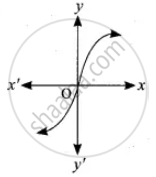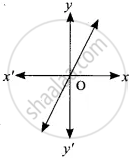Advertisements
Advertisements
प्रश्न
Let f: A → B be a function defined by f(x) = `x/2` – 1, where A = {2, 4, 6, 10, 12}, B = {0, 1, 2, 4, 5, 9}. Represent f by a table
उत्तर
A = {2, 4, 6, 10, 12}
B = {0, 1, 2, 4, 5, 9}
f(x) = `x/(2) - 1`
f(2) = `(2)/(2) - 1` = 1 – 1 = 0
f(4) = `(4)/(2) - 1` = 2 – 1 = 1
f(6) = `(6)/(2) - 1` = 3 – 1 = 2
f(10) = `(10)/(2) - 1` = 5 – 1 = 4
f(12) = `(12)/(2) - 1` = 6 – 1 = 5
| X | 2 | 4 | 6 | 10 | 12 |
| f(x) | 0 | 1 | 2 | 4 | 5 |
APPEARS IN
संबंधित प्रश्न
Determine whether the graph given below represent function. Give reason for your answer concerning graph

Determine whether the graph given below represent function. Give reason for your answer concerning graph

Let f: A → B be a function defined by f(x) = `x/2` – 1, where A = {2, 4, 6, 10, 12}, B = {0, 1, 2, 4, 5, 9}. Represent f by set of ordered pairs
Let f: A → B be a function defined by f(x) = `x/2` – 1, where A = {2, 4, 6, 10, 12}, B = {0, 1, 2, 4, 5, 9}. Represent f by an arrow diagram
Let f: A → B be a function defined by f(x) = `x/2` – 1, where A = {2, 4, 6, 10, 12}, B = {0, 1, 2, 4, 5, 9}. Represent f by a graph
Represent the function f = {(1, 2), (2, 2), (3, 2), (4, 3), (5, 4)} through an arrow diagram
Represent the function f = {(1, 2), (2, 2), (3, 2), (4, 3), (5, 4)} through a table form
Represent the function f = {(1, 2), (2, 2), (3, 2), (4, 3), (5, 4)} through a graph
Multiple choice question :
f(x) = (x + 1)3 – (x – 1)3 represent a function which is
Given that f(x) = `{{:(sqrt(x - 1), x ≥ 1),(4, x < 1):}` Find f(a + 1) in terms of a. (Given that a ≥ 0)
